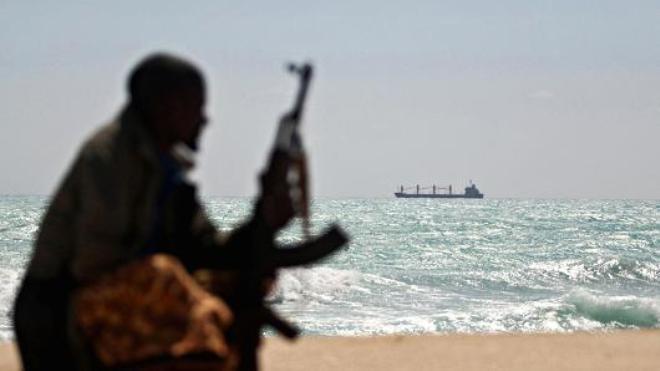
Luke Graham
Thursday May 4, 2017

An armed Somali pirate sits along the coastline while the Greek cargo ship, MV Filitsa, is seen anchored just off the shores of Hobyo town in northeastern Somalia where its being held by pirates.
The economic cost of maritime piracy is increasing once again as Somali pirate networks resume attacks on ships, while kidnapping for ransom becomes a more popular tactic, according to a new report.
The State of Maritime Piracy 2016, a new report released Wednesday from NGO group Oceans Beyond Piracy (OBP), claims the economic cost of piracy caused by groups in Somalia increased to $1.7 billion in 2016, from $1.3 billion in 2015. This total includes costs paid by shipping operators for increased insurance, labor, armed guards and other protection measures, as well as ransoms paid by insurers and the costs of naval deployments.
The cost had been trending downwards from $7 billion since 2010 due to counter-piracy measures, but the report claims that decreased vigilance by the shipping community, such as hiring smaller private security teams, may have encouraged pirate groups.
While zero vessels were hijacked in 2016, there were 27 reported incidents of pirate activity, according to the report. In 2017, there have been two high-profile hijackings by Somali pirates, including the Aris-13 tanker in mid-March and a commercial Indian ship in April.
Emma Gordon, senior Africa analyst at global risk consultancy Verisk Maplecroft, criticized the complacency of shipping operators. Only 31.5 percent of operators employed armed guards by the end of 2016.
"Somali piracy is still a long way off 2012 levels. However, the recent attacks highlight that the pirate groups remain operational, and will be quick to capitalize on vessels that do not strictly adhere to advanced security measures," she told CNBC via email.
"The importance of having armed guards is evident when looking at two recent tanker incidents. In October 2016, a U.K.-flagged chemical tanker fended off an attempted hijack when the armed guards engaged pirates in a firefight. By contrast, the Aris-13 – the first commercial vessel hijacked since 2012 – had no armed guard, and was ignoring best practice guidance on route and speed."
This spike in activity has been blamed on the socio-political situation in Somalia. The OBP report says the lack of economic opportunity and law enforcement in the country remains unchanged, allowing piracy to flourish.
Similarly, Thomas Waldhauser, the commander of U.S. military operations in Africa, said during a press conference in Djibouti that the spate of attacks was due to widespread drought and famine in the region, as many of the ships targeted carried food and oil, the Washington Post reported on April 23.
Gerry Northwood, chief operating officer at MAST, the maritime risk management consultancy, blamed the rise in attacks on the decreased naval presence in the region.
"The withdrawal of navies from the region and many vessels not having in place sufficient security measures, coupled with reports of extensive illegal fishing in Somali waters, will make Somalis return to the business model which proved so lucrative between 2008-2010, meaning seafarers will again be the ultimate victims of criminal activity, as we saw with the hijacking of the Aris 13," he told CNBC in March in an email.
While much attention is paid to Somalia, attacks in West Africa are also increasing. There were 95 reported attacks in the region in 2016, up from 54 in 2015, with two-thirds of attacks taking place near Nigeria. Kidnap for ransom attacks increased, with 18 incidents of kidnapping and 96 seafarers taken hostage, up from 44 the previous year.
"One of the reasons we are observing increased incidents of kidnap for ransom is that the model offers financial gain with less risk to the perpetrators than hijacking for cargo theft," said Maisie Pigeon, a lead author of the OBP report, in a press release.
"Unfortunately, these kinds of attacks appear to have continued into 2017."